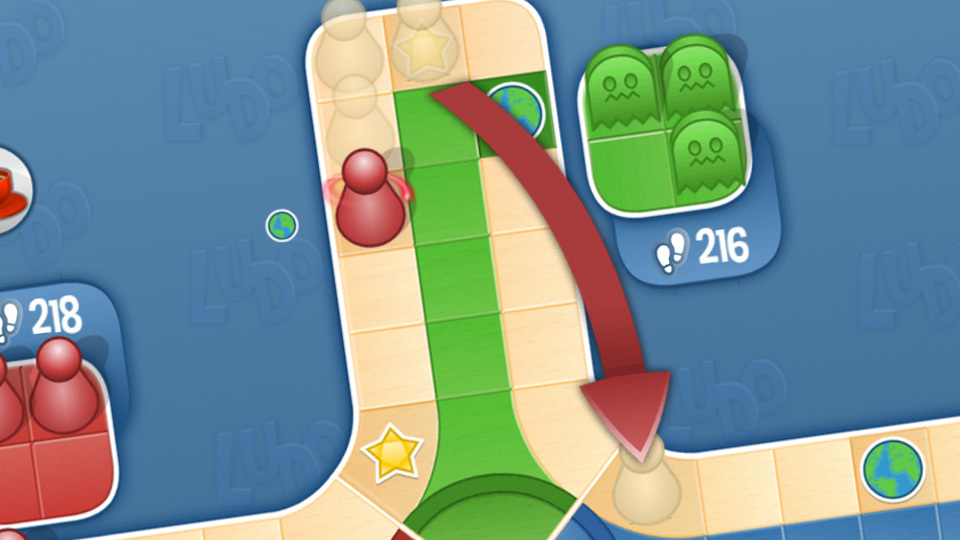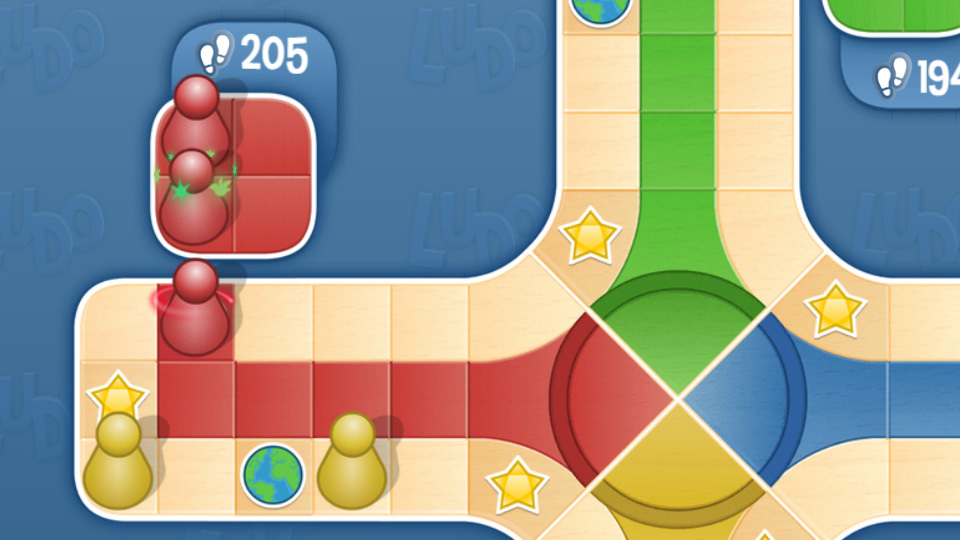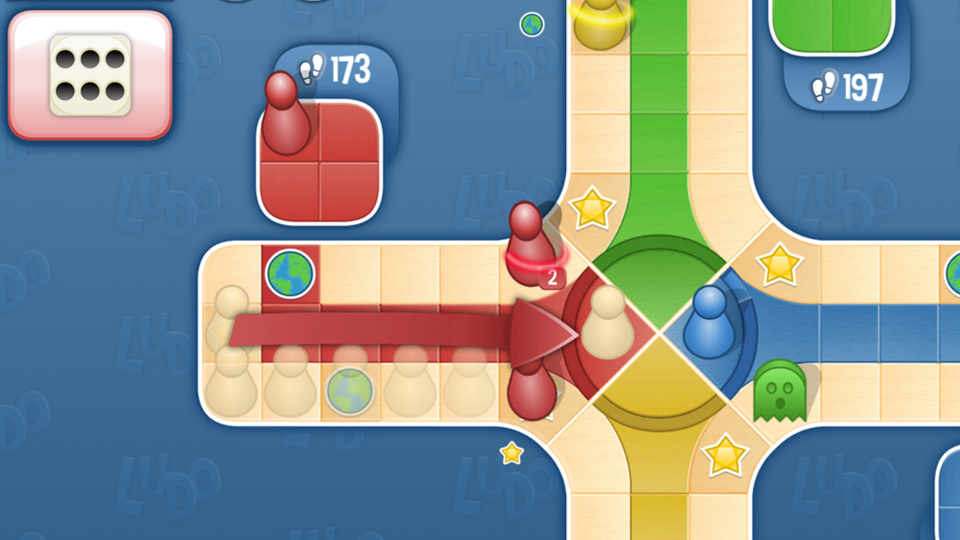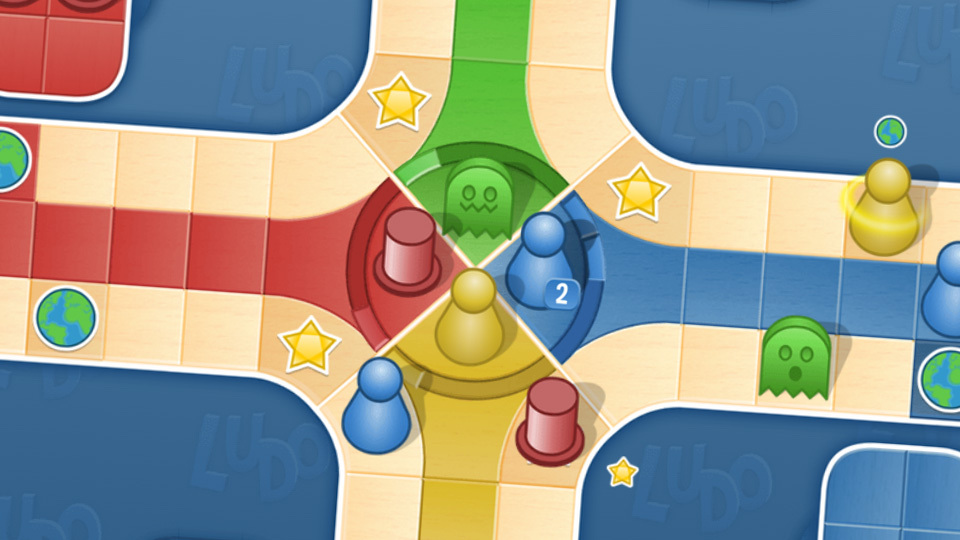











Ludo is a classic board game for two, three or four players. Send your opponents home with one throw and get your pieces behind the finish line to win. You play for fun new pieces, rating points and to have endless fun with other players.
Ludo is a board game for 2-4 players and a game that can be enjoyed by the whole family. It is played by giving each player four pieces, a dice and one of four possible starting areas. The goal is to move your pieces all the way around the board to reach the target area. Players take turns rolling a dice that determines how far a piece can be moved. The first player to get all their pieces to the goal wins the game.
If a player moves their piece so that it lands on top of an opponent's piece, the opponent's piece is moved all the way back to its starting area. The general strategy in the game is to prevent your own pieces from being knocked home, while at the same time trying to land on your opponents' pieces to knock them home.
There are two ways to secure your pieces from being knocked home; by having them standing on a globe square, or by having two or more pieces standing on the same square. In addition to the pieces being safe, an opponent's piece that lands on the field will be knocked home.
We want to make it clear that all types of tactical play ARE ALLOWED in ludo and tournaments and you can use all the seconds in the game to make your move.
Enjoy a good game of Ludo
The best way to start a new game is to press "Find games" and let the game find suitable opponents for you. This ensures that you get opponents with a rating close to your own as far as possible, and that you get started playing quickly.
When finding games, the most popular set of rules is always selected.
Instead of using the popular "Find games" function, you can choose your own rules and invite those you want to play with, or search for people who want the same set of rules.
Battle Ludo is a particularly aggressive variant of Ludo, where players are forced to capture opponents' pieces as soon as possible. If you miss the opportunity to capture an opponent's piece, your own piece is captured.
Friendship Ludo prevents players from capturing each other's pieces. If you land on an opponent's piece, the piece moves one square forward until it lands on a free square.
Number of players can be set from 2-4. This number includes any computer opponents.
Dice can be either Ludo dice or regular dice. The difference is described below.
Invite button opens a menu where you can chat and invite friends or robots to join your game. Players with a green ludo tile next to their name are online in Ludo and ready to play, while players with a red ludo tile next to their name are online in Ludo but already playing. A small red dot next to a player's name means they are offline, while a green dot indicates they are online in another game on Komogvind. Therefore, you should always invite people with either a green tile or a green dot next to their name, as they are more likely to have time to play. Computer opponents can also be invited.
You don't need to invite anyone to use the "Select rules" function. You can also just select the rules you want to play with and press the search button. If there are other players searching for a game with similar rules, you will automatically be put together.
Ludo can be played with two types of dice - either a regular six-sided dice or the very popular Ludo dice.
Ludo the dice has six sides, but the eyes 3 and 5 are replaced by a globe and star. If you roll the globe, you must move a piece to the nearest globe space on the board - also from your starting area. A six also entitles you to move a piece out of the starting area. If you hit a star with the dice, you can move a piece to the nearest star field - and then jump to the next one. If a piece is too close to the target to benefit from a globe or star, the roll cannot be used on that piece. All other rolls give the right to move a piece the number of squares shown by the eyes. Extra rolls are given by rolling a globe or a six.
Regular is a six-sided cube without a star or globe. It requires a six to move a piece out of the starting area, while all other rolls allow you to move a piece the number of squares shown by the eyes. Extra rolls are only given when six is rolled.
For both dice, the number of extra rolls is limited to one.
In Ludo, you can earn different pieces if you achieve the following in a regular game (not a tournament):
Ghost: Place all four pieces on globes.The game board has several special areas and squares.
The starting area is where the four checkers start. To take a piece out of the starting area, you must roll a globe or a six. If you have all your pieces in the starting area, you get up to three rolls of the dice before you move on.
The target area is where the four pieces are moved to. The board is played clockwise. Each player has their own target area and no other player can move their pieces into it. To reach the end of the target area, you must hit it exactly - otherwise you have to move your piece in the opposite direction.
Globe fields protect the pieces from being knocked home. If an opponent's piece lands on a protected piece, it will be knocked home itself. However, there is an exception for the colored globe squares. For example, only red pieces can be protected on the red globe field, regardless of the number of pieces on the field. If you have two pieces on your opponent's colored globe, they can both be knocked home.
Star squares act as shortcuts that can bring the pieces faster to the target area. If a piece lands on a star, it must be moved to the next star. If it is the star in front of the goal area that is landed on, the piece is moved directly to the goal.
Board game Ludo can be a long game, so sometimes you need to leave the game briefly to get coffee or something else. In that situation, you can press the coffee cup and let the computer take your moves for you without your opponents having to wait for you. However, you can only be under computer control for a maximum of five minutes, so make sure to keep your breaks short.
If you are inactive for longer than five minutes, you will be removed from the game in the same way as if you had left it by giving up. The computer will then take control of your pieces and you will be given a penalty of 50 squares - this means that you will probably not be able to win the game if you have left it, even if the computer continues playing for you.
The winner is of course the one who gets all their pieces to the finish line first. The secondary positions are initially determined by how close the players are to winning. In the event of a tie, a number of other factors will come into play: squares moved, penalty received, time under computer control and finally the draw.
When a game is started, a pool of tokens is created - 10,000 per player. The pool is distributed among the players when the game is over. If there are computer opponents in the game, the pool will be smaller.
In Ludo, ratings are distributed at the end of the game. How the points are distributed depends on the rating differences between the players and the outcome of the game. The better an opponent you beat, the more rating you get. Similarly, if you lose to a low-rated opponent, you also lose a lot of rating. To prevent high rated users from staying in the top spots forever by stopping playing, your rating automatically drops by 1% when you haven't played for 14 days.
Ludo is an exciting board game that brings family and friends together for a fun and competitive gaming experience. It is usually played by 2 to 4 players and is known for its colorful board and distinctive pieces.
Players must strategically plan their moves and consider possible risks and rewards. It's important to find the right balance between moving your own pieces forward while blocking or knocking out your opponent's pieces. Luck also plays a role, as the roll of the dice determines how far and how fast the pieces can move.
Ludo is not only fun, but it also promotes social interaction and cooperation. It's a great way to spend time with family and friends, creating memories and laughter along the way. The game is also suitable for players of all ages as it is easy to learn and play.
Ludo is available in different editions and formats, including physical board games, online versions and even mobile apps. This allows players to enjoy the game on different platforms and customize the game to their preferences.
Ludo is a timeless classic in board games and continues to be one of the most loved and played games in the world. It's a game that brings joy, laughter and excitement to any game night or gathering. Whether played as a casual pastime or as an intense competition, Ludo is a favorite among many players.
Tags: Board game, each player chooses, pachisi, Cowrie Shells
Love ludo used to play it as a board game as a child. But can never win T ludo tournaments. X
It is funny how the game can make you so mad at the dice, they kill your moves. Like the bloody 2 while on a Star!
I love playing ludo and mostly this game is very fair and fun to play. but there's very less players around here
love this game. Should be more player join to play. About this game I have good memories from my childhood. Recommended everyone
Come Play Ludo Standard Or Ludo Battle Great Game I Love It The Games Are Great On This Site And I Have Also Met Many New Friends Thanks PAW
5 stars.
This game is very challenging and strategic. Love competing against other players so you will never be bored.